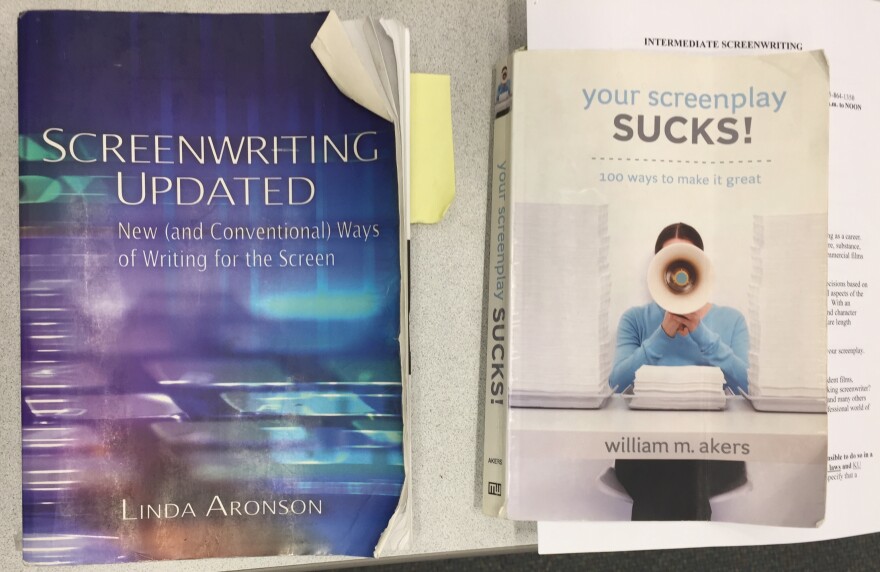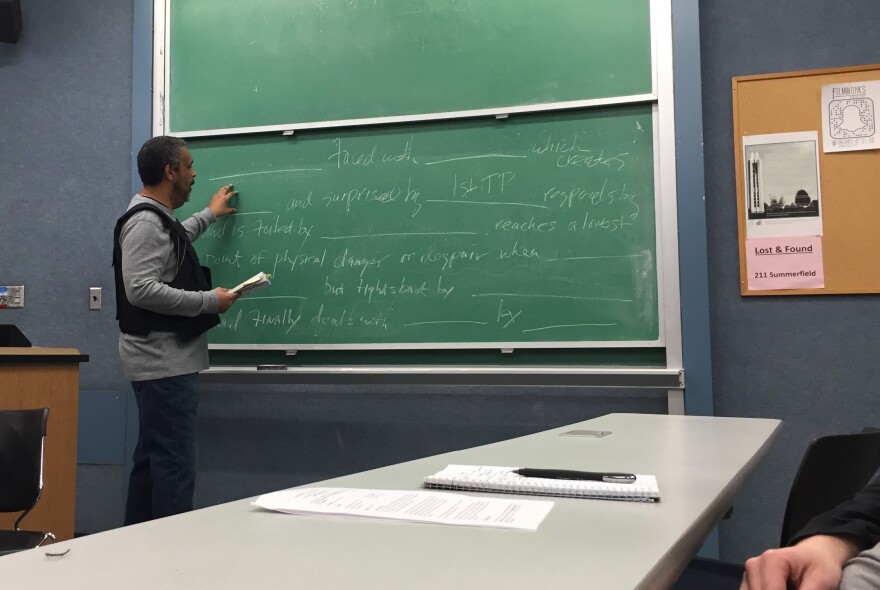University of Kansas film professor Kevin Willmott made national headlines last fall for wearing a bullet-proof vest in protest of a new state law allowing concealed weapons on campuses. He said he’d wear the vest until the law changed.
And with start of the spring semester this week, Willmott is keeping that promise.
Just after 4 p.m. on Tuesday, the 25 or so students who had enrolled in Willmott's Intermediate Screenwriting class were waiting in room 426 of Summerfield Hall, with tiered rows of seats bolted to the floor. Willmott was carrying the vest when he walked in, and the chatter grew quiet as he started to strap it on.
The ritual took a while.
“OK," he said, "how you guys doing? I’m Kevin Willmott, this is intermediate screenwriting.”
Many of these students had obviously had other classes with Willmott, who has made several films but is best known for working with Spike Lee; Willmott caught Lee's attention at the Sundance Film Festival more than a decade ago with his C.S.A.: Confederate States of America and has since worked with Lee on Chi-Raq.
He went through the syllabus quickly, letting the students know how to contact him and what they could expect.
Then there was the gun stuff.
“The gun policy, which is why I'm wearing this vest," he said.
He began reading KU's official language regarding the concealed carry of handguns.
"Individuals who choose to conceal handguns are solely responsible to do so in a safe and secure manner in strict conformity with state and federal laws and KU weapons policy.”
The safety measures in KU's weapons policy are detailed:
Every handgun carried by an individual into any University building in which concealed carry is allowed must be secured in a holster that completely covers the trigger and the entire trigger guard area and that secures any external hammer in an un-cocked position through the use of a strap or by other means. Handguns with an external safety must be carried with the safety in the “on” position. The holster must have sufficient tension or grip on the handgun to retain it in the holster even when subjected to unexpected jostling. Semiautomatic handguns must be carried without a chambered round of ammunition. Revolvers must be carried with the hammer resting on an empty cylinder.
Willmott read most of these rules verbatim, and hearing them was a sobering reminder of this new aspect of campus life. Professors aren’t required to include them in the syllabus, he later told KCUR, but it’s recommended.
He emphasized to the class that he wasn't wearing the vest because he was afraid of his students, but in protest of a law he considers absurd.
“If you’re interested in more about my feelings on this, I have a handout you can take at the end of class that spells out why I wear the vest," he said, before moving on to discuss the rest of the course requirements.
Students would read and critique each others' work, and by the end of the semester they would write a full-length, 30-page screenplay (the graduate student in the class would write 60 pages). There was talk of formalities, such as the official software to use for screenplays.
Then Willmott asked students to talk about their favorite films. When one said his go-to was "Baby Driver," which Willmott and several others had seen, it provoked a long and lively conversation about character development, soundtracks, story structure, and the choices screenwriters make, such as how to make an audience care about a character in danger.
“Why is he in danger? What makes – is it just danger in general? What kind of danger is it? What do you think,” he asked, pointing to one student.
“I mean, they’re performing illegal acts, so it’s literally violent danger they’re escaping,” the student said.

“So he’s not out rescuing babies. He’s not rescuing grandmothers. He’s not rescuing folks in trouble. What are they doing?"
"They're robbing banks," someone said.
"They’re robbing banks! They’re robbing banks!" Willmott emphasized how the screenwriter had made them care about — root for, even — a character who was doing something that was wrong.
They went over fundamentals of structure, such as whether their movie idea has more than a first act.
Willmott is a natural performer himself, and as he supplemented the textbook with stories about his own experiences in the professional film industry, it was easy to focus on the captivating conversation rather than the vest. It felt as if, over the course of a semester, students might stop noticing he was even wearing it.

But that's not the case.
"When he first started it, there was more buzz," said Jasmine Lawson, who had Willmott's class last semester. "But I think the fact that he comes in to class every day and we see him put on the vest, it’s kind of a constant reminder of his protest.”
She said he respected what he was doing, and noted that most students on campus were uncomfortable with the gun policy.
“I think it's cool that he shows his protest publicly and it's also a nice form of a peaceful protest," Lawson said.
After class, Willmott told me he purposefully put on the vest at the beginning of each class so students wouldn't forget he was wearing it.
“The problem with the whole policy is the normality of it," he said. "The fact that it’s so easy to get used to living with the reality of people having guns in their backpacks.”
Willmott isn’t wearing it all the time – just in class. So his students are generally the only ones who see it. It’s not as if he’s making a grand statement to everyone he encounters in the course of a day on the KU campus. But he’s committed to it.
“I’ve gotten a few letters that are semi-threatening or whatever," he said. "But as a whole, I think people were supportive because I don’t think anybody knew how to respond to the policy.”
And the policy isn't going to change any time soon.
“This is my thing now,” he said of the vest.
“That’s the thing I see happening to us is there’s this slow eroding of our natural life that we used to have. A natural life where guns weren’t always a part of every aspect of it.”
And because we're talking about a film class, let's call that a metaphor for what's happening throughout American life.
C.J. Janovy is an arts reporter for KCUR 89.3. You can find her on Twitter, @cjjanovy.




